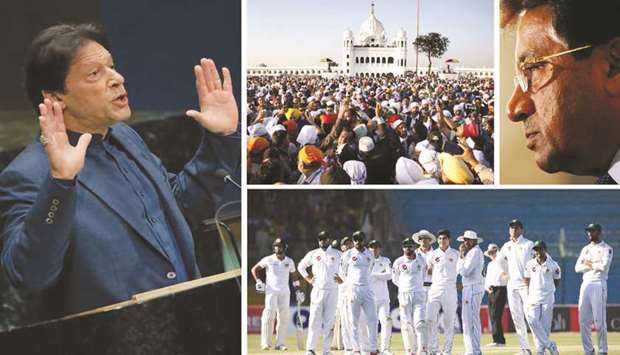With just a few days left for the advent of the New Year, it’s time to look back at what has been a tumultuous year by all counts for Pakistan and its relatively new government led by Imran Khan.
It has been marked by two major areas: foreign policy and domestic politics. Given the demanding situation, it was no surprise to see the Khan government struggling to balance the scales.
In the first major challenge of the year, a suicide attack on February 14 in Pulwama district of Jammu & Kashmir on a convoy of Indian security personnel just weeks ahead of the Indian general elections, saw the already fragile bilaterals nosedive. New Delhi quickly blamed it on Islamabad, which condemned the attack, denied it had anything to do with it, and offered swift action if Delhi provided credible evidence.
The attack however, snowballed into a major crisis. Amid a cacophony of war drums, Indian fighter jets crossed the Line of Control 12 days later and claimed to have conducted a “surgical strike” in Balakot area and demolished a terrorist camp with 300-350 casualties. Pakistan denied the claim — saying neither was there any camp nor any casualty. Independent reports, including high resolution satellite images reviewed by Reuters, contradicted the claims of any damage.
The very next day however, Pakistan Air Force jets also crossed Indian territory, in a symbolic reprisal, but whilst returning its fighter jets were engaged by Indian Air Force jets. In the ensuing dogfight, an Indian MiG-21 was shot down on the Pakistani side of the border and its pilot captured. In a goodwill gesture, Pakistan Prime Minister Imran Khan returned the pilot four days later.
However, ties remain in cold storage throughout the year. In keeping with their longstanding dispute over Kashmir, the revocation of Article 370 in August by New Delhi startled Islamabad, which launched a campaign to highlight the issue, resulting in that resonating speech by Prime Minister Imran Khan at the UN General Assembly.
Khan warned that if the world did not intervene, he feared the two nuclear-armed countries could easily be drawn into a dangerous confrontation with catastrophic outcome.
He also used the opportunity to raise a clarion call against Islamophobia and exhorted the West to try to understand the sentiment of Muslims, especially when it comes to acts of deliberate sacrilege of their beloved Holy Prophet Muhammad (peace be upon him).
But the major foreign policy success was the return to normality in ties with Washington. Evidently, the Trump Administration had little choice but to re-engage with Islamabad to seek its leverage on peace in Afghanistan after exhausting all options. The comeback trail was pronounced with Prime Minister Khan twice holding widely followed talks with Donald Trump at the White House and on the sidelines of the UNGA session.
But his shiniest hour was the much celebrated inauguration of the Kartarpur Corridor in November to facilitate Sikh pilgrims from all over the world, including India, to visit the last resting place of Baba Guru Nanak Dev, the founder of Sikhism. It drew global attention amid scenes of emotional reunion that had eluded his followers for decades.
On the domestic front, Khan’s government had its hands full. Islamabad eventually opted for an IMF bailout, which did not win Khan, who had vociferously opposed it as an opposition leader, any favours. However, at year end, Pakistan’s economy is showing signs of a recovery with the Moody’s returning Islamabad to “stable” status. The country also jumped 28 spots to 108 in World Bank’s Doing Business 2020 Study which made it among the world’s 10 top business climate improvers.
Far more contentious was the white noise over tax reforms. The government relaxed the terms of engagement but defied strong-arm tactics from the usual suspects — the traders — to put the absentees on notice. As a result, there was a considerable surge in tax filers.
Prime Minister Khan also found out in the course of his first year in power that governance was no cricket field where he enjoyed iconic status. All year through, he faced the brunt of an opposition that simply did not allow his government any breathing space.
The highlight was a Long March led by Fazlur Rehman, a firebrand cleric and leader of his faction of Jamiat Ulema Islam, who is still smarting from losing his contested seats in the 2018 general elections. Rehman led a sit-in in Islamabad and vowed not to leave without seeking the PM’s resignation. But he announced a sudden exit only 16 days later with a largely empty rhetoric of having achieved his ‘objectives’.
The government was also under pressure to let convicted and jailed former prime minister Nawaz Sharif leave for the UK on medical grounds after a court released him conditionally.
But while Sharif’s flight hogged the newsbeat for a while before being relegated to the sidelines, Khan was soon faced with the rigmarole that the extension in service he signed for the army chief and taken for granted assumed a life of its own at the Supreme Court when a petitioner challenged its bona fides. Long story short, the apex court decided to hand in the benefit of doubt with a six-month timeline for the government to legislate the decision.
But the death sentence awarded to ex-army chief General (retired) Pervez Musharraf in a case of high treason appeared to set the cat among the pigeons with the army publicly questioning the verdict — a first on both counts. The government is slightly under the weather after declaring it would challenge the ruling in what is seen as an appeasement.
The biggest draw for Pakistanis however, was in the realm of what is their biggest uniter: cricket. The return to Test cricket at home after Sri Lanka defied the odds to play the first such series in Pakistan in a decade lifted the national spirit. Winning it handsomely almost paled in comparison to the significance of the development as hope began to find newer grounds. Sri Lankan captain Dimuth Karunaratne, who had only three months earlier pulled out of a much shorter trip, declared Pakistan “200 per cent” safe for cricket.
As if a stamp of approval was needed on the ease of business, Condé Nast, the world’s premier luxury travel magazine, ramped up the volume and declared Pakistan the No.1 destination in the world for the year 2020!
* The writer is Features Editor. He tweets @kaamyabi

YEAR-ENDER: Clockwise, Prime Minister Imran Khan addressing the UN General Assembly session; Sikh pilgrims throng the last resting place of Baba Guru Nanak in Pakistan following the inauguration of the Kartarpur Corridor; General (retired) Pervez Musharraf, who was awarded capital punishment; and the victorious Pakistan cricket team during the Test match against Sri Lanka in Karachi, which marked the first time in a decade that a Test was played at home.

